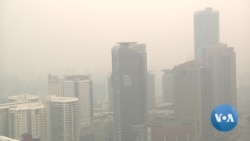ຝົນຕົກໄດ້ຊ່ວຍບັນເທົາຄວັນຈາກໄຟໄໝ້ປ່າ ທີ່ປົກຄຸມສ່ວນໃຫຍ່ຂອງປະເທດມາເລເຊຍ ແລະສິງກະໂປ.
ຄວັນພິດດັ່ງກ່າວໄດ້ລົບກວນຊີວິດການເປັນຢູ່ຂອງປະຊາຊົນຫຼາຍໆລ້ານຄົນຢູ່ໃນປະເທດທັງສອງ.
ການໃສ່ໜ້າກາກແມ່ນເປັນເລື້ອງທີ່ເຫັນກັນໂດຍທົ່ວໄປ ໃນຂະນະທີ່ຜູ້ຄົນພະຍາຍາມຫາທາງປ້ອງກັນເຂົາເຈົ້າ. ໂຮງຮຽນຢູ່ປະເທດມາເລເຊຍຫຼາຍໆບ່ອນໄດ້ພາກັນອັດເປັນເວລາຫຼາຍໆມື້ ກ່ອນທີ່ສະພາບອາກາດຈະເປັນອັນຕະລາຍຫຼາຍກວ່ານີ້.
ຄວັນສ່ວນໃຫຍ່ແມ່ນມາຈາກປະເທດອິນໂດເນເຊຍ ບ່ອນທີ່ມີການຈູດໄຮ່ເຜົ່າປ່າສຳລັບການປູກຕົ້ນພາມເຮັດນ້ຳມັນ ຕະຫຼອດທັງການປູກຕົ້ນໄມ້ເຮັດເຈັ້ຍ ແລະປູກໝາກເພັດ. ບ່ອນປູກຝັງບາງແຫ່ງແມ່ນບໍລິສັດມາເລເຊຍເປັນເຈົ້າຂອງ.
ສະມາຄົມບັນດາປະຊາຊາດໃນເຂດເອເຊຍຕາເວັນອອກສຽງໃຕ້ ຫຼືອາຊຽນ ໄດ້ຕົກລົງກັນກ່ຽວກັບເລື້ອງຄວັນພິດ ເພື່ອຮັບມືກັບບັນຫານີ້ ແຕ່ກໍເບິ່ງຄືວ່າ ມາຈົນຮອດປັດຈຸບັນ ກໍບໍ່ໄດ້ດຳເນີນການຫຍັງຫຼາຍ.
ທ່ານນິທິ ນາຊາດູຣາຍ ປະທານສະມາຄົມປົກປ້ອງສິ່ງແວດລ້ອມຂອງມາເລເຊຍ ຊຶ່ງເປັນອົງການຈັດຕັ້ງທີ່ບໍ່ຂຶ້ນກັບລັດຖະບານ ກ່າວວ່າ "ຂໍ້ຕົກລົງວ່າດ້ວຍຄວັນພິດຂ້າມຊາຍແດນຂອງອາຊຽນ ສ່ວນໃຫຍ່ແລ້ວແມ່ນກໍລະນີ ຄືກັນກັບເສື້ອເຈ້ຍ. ມັນເປັນເລື້ອງທີ່ຢູ່ໃນເຈ້ຍ ແຕ່ໂຕຈິງແລ້ວ ບໍ່ມີຜົນຫຍັງຫຼາຍ."
Seasonal rains have brought relief from the haze that blanketed much of Malaysia and Singapore.
The toxic air disrupted life for tens of millions of people.
Face masks were in common usage as people tried to protect themselves. Many Malaysian schools closed for days because the air was so hazardous.
Much of the smog stemmed from Indonesia, where fires were set to clear land for palm oil plantations, as well as pulp and paper. Some of the plantations are owned by Malaysian companies.
The Association of Southeast Asian Nations (ASEAN) has a haze agreement to try to combat the issue, but it seems to have done little so far.
“The ASEAN trans-boundary haze agreement has largely been a case of being like a paper tiger,” said Nithi Nesadurai, president of the Environmental Protection Society Malaysia, a nongovernment organization. “It’s something there on paper, but really has very little effect.”
The haze happens almost every year, although health advocates say the pollution was worse this year compared with any since 2015. Local doctors reported a surge in illnesses.
Dr. Jessreen Kaur of Kuala Lumpur says she prescribed antibiotics and antihistamines to many patients.
“There are a lot of upper respiratory tract infections coming from the haze.” Kaur said. “More people are getting infected tonsils, infections of the pharynx and also lung infections.”
ASEAN ministers have talked about closer cooperation on the issue. In Malaysia, discussions are underway about drafting a law that would punish Malaysian companies that start fires in a foreign country.
“It enables the Malaysian government to take action against a Malaysian company which is causing pollution on foreign soil,” Nesadurai said. “This will be a means of deterrence, especially if one of them gets punished.”
Nesadurai adds that more needs to happen at the grassroots level. Environmental groups like his are calling for federal and local governments, as well as the companies that own the plantations, to partner with local communities to try to prevent the fires from happening in the first place.
“The most effective action can take place if the stakeholders work together,” Nesadurai said.
The Global Environment Center, a nongovernment organization, has worked in several communities in Malaysia and Indonesia. It connects with plantation owners and people who live near the plantations. It teaches techniques to help prevent fires and also provides firefighting equipment, as well as training, to help locals contain a land fire until professional firefighters arrive.
“This community approach makes a difference,” said Adelaine Tan, coordinator of outreach and partnership programs, at the Global Environment Center. “But we have a limited budget, so we can’t reach everywhere it’s needed.”
Malaysians can breathe easier for now, but concerns linger that this problem could ignite again next year.
“Something needs to be done,” said Manisa McCalman of Kuala Lumpur. “Whenever we have this problem, you don’t want to even go outside.”





